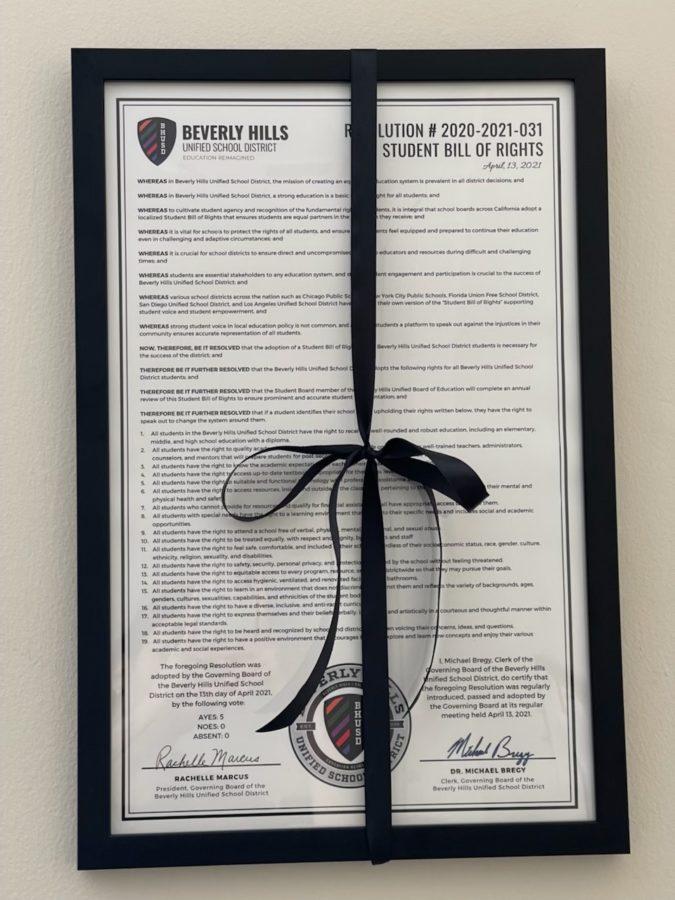Emma Newman staff writer
The Board of Education unanimously approved a student bill of rights, created by the Generation Up (GENup) club, in a board meeting on April 13.
The bill’s creation, spearheaded by GENup club president junior Aghigh Banitaba, was designed to highlight student rights the club feels the district should follow. GENup members worked with the Board of Education and administration members to improve the bill before it was approved as a resolution.
GENup created the bill of rights to bring to light issues that club members feel are often ignored in the district.
“GENup decided to make a bill of rights to address our rights and freedoms which we feel are not as acknowledged by the public education system as they should be,” club member junior Defne Onal said. “This includes free expression of sexuality, gender, race and ethnicity. Also, additionally, we’d like efficient and easy to find financial assistance for students.”
Banitaba decided to lead the charge to create a student bill of rights after seeing it as an ongoing campaign by the official GENup organization. The bill spoke to her because no other similar list of rights existed for students before.
“The bill of rights, more than anything, is a document for students to learn their rights and to reference later on if any of the rights are not being met,” Banitaba said. “Because such [a] document doesn’t exist right now, we thought it was important to start this initiative.”
Banitaba’s role in the project was leading, writing and collaborating with the necessary individuals to push forward the bill of rights.
“I started the initiative, collaborated with my fellow team members to co-author the bill, got feedback from teachers and students and then communicated with administration to present to the Board of Education,” Banitaba said.
Other GENup members helped Banitaba write and edit this document, including Onal and junior Georgia Evensen. Both Onal and Evensen had active roles in the editing process, with Evensen specifically focusing on structure and wording.
“Throughout the process, the biggest role for me has been to help revise the document and look over it again and again and make sure everything we’re saying is the most concise and the most well-worded and reassure that it’s the best it can be,” Evensen said.
Next, Banitaba shared this document with Superintendent Dr. Michael Bregy and Assistant Superintendents Laura Chism and Dustin Seemann, who she worked the most closely with.
“[Seemann] gave us a lot of advice on how to present to the board of education, what the process should be, [and] how to engage middle school and elementary school students,” Banitaba said. “He really helped us a lot.”
GENup also took the document to members of the Board of Education for their feedback.
“The work they did on this…was incredible,” Board President Rachelle Marcus said in Tuesday’s board meeting. “The experience was really wonderful, and they were willing to accept people making suggestions and they went back and they really worked on them.”
Finally, the Board of Education voted on these ideas at the board meeting.
Among the ideas, Onal believes the most important is the right of financial assistance, despite the fact that the district is well-known for containing wealthy students.
“Financial assistance…is not as talked about because this is Beverly Hills, and I think it’s more important for us as a school to talk about it because [although] it might be a minority, still, there are people who can’t afford the same things that other students can,” Onal said. “I think the importance of acknowledging that situation means equal access to education.”
Evensen believes that the more “technical” aspects of the document are less important. Instead, she believes that the rights that specifically talk about freedom of speech and safety are the most essential.
“There’s a lot of rights about students feeling like they can be in a safe and inclusive environment, and [feeling like] they can express themselves freely. I feel like, for me, those are super important rights [that] not a lot of other documents about student rights will talk about,” Evensen said. “The rights about students’ emotional well-being is really important…and I’m glad that we have those on there.”
Even though these various rights are now available to students, Bregy believes GENup’s work is not finished. Instead, he believes these rights should be advertised.
“This really opens up the next phase, which is more of an awareness phase because there are a lot of people that are at home that this bill represents as students,” Bregy said in Tuesday’s meeting. “It doesn’t just get signed and then we move on. Students need to be aware of this.”
Once students are aware of their rights, he also believes that it is necessary for them to take responsibility for doing their part as well.
“There’s accountability for staff. Now, there’s accountability for students, and working together [is] how we can make sure we uphold these resolutions so they’re not just passed and put away,” Bregy said.
Banitaba believes in these ideas and hopes that all students will eventually be aware of the bill of rights. If they do, Evensen believes future generations of students will be able to “speak up for themselves.”
“We want future generations of students…to feel like, especially now in like this really uncertain environment with COVID [and] going back to school in a way that we never [have] before, they have this document to fall back on and that their rights are secured,” Evensen said. “They can look at this document and speak for themselves and voice their concerns [and] actually hav[e] something to back that up.”





























